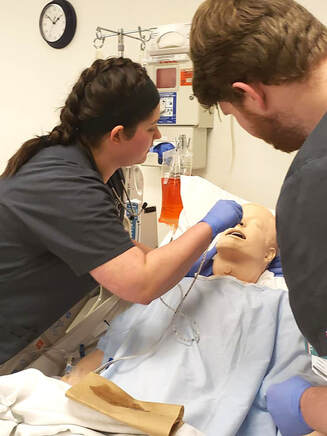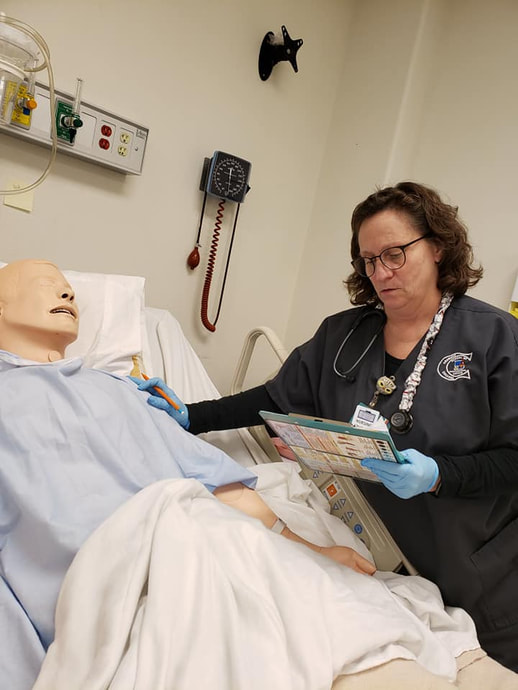Crowder College nursing students, instructors face unique challenges
July 29, 2020
 Above, student Dakota Ellis (left) places a nasogastric tube while student Scott Aldridge (right) looks on.
Above, student Dakota Ellis (left) places a nasogastric tube while student Scott Aldridge (right) looks on.
Sheila Harris
Sandy Wilson, Director of Nursing over Crowder College’s nursing progam, said things got interesting in a hurry for both instructors and students when COVID-19 broke out in the spring.
“We had to switch to virtual classes, which was a transition in itself,” she said. To add to the challenge, we were immediately knocked out of ‘clinicals’ - the hands-on training students receive when participating in real-life hospital and other medical settings. When hospitals closed their doors to visitors for health and safety concerns, that included nursing students as well.”
Kimberly Smith, Nursing Program Coordinator for Cassville’s Crowder campus, agrees with Wilson’s assessment.
“Our program was dramatically affected by COVID-19,” she said. “In fact, our first-semester nursing students have not yet participated in any in-person clinical experiences.”
Crowder’s four-semester nursing program offers highly sought-after training for students on the path toward Registered Nurse licensure.
“We have space for about 27 new students at the beginning of our spring semester, which starts in January,” Smith said. “We typically have about twice that many applicants for the spots.”
According to Smith, prospective nursing students do not appear to be put off by the inherent risks associated with choosing nursing as a career during the challenges presented by the outbreak of COVID-19 across the nation.
“The number of applicants for our spring semester appears to be on par with years past,” she said. “The deadline for submitting applications is September 1, so we’ll know more as we get closer to that date.”
Smith, a Kansas City native, now living in Mt. Vernon, has been working with Cassville nursing students since 2011.
“I taught clinicals for several years here before acquiring my Master’s degree in 2016, after which I accepted the Program Coordinator position.”
Smith, whose grandfather died during a seven-bypass heart surgery performed, is particularly intrigued with cardiac function.
“During my own nursing surgical clinicals,” she said, “I remember praying for a patient undergoing open heart surgery, that his heart would begin re-beating after it was artificially stopped by the surgeon for a short period of time. The heart is an amazing organ and its function never ceases to amaze me.”
Smith brings empathy and experience to her role as nursing program coordinator.
“I’m proud of my students,” she said. “For the past three years we have had 100 percent licensure pass rate for those who have taken state board exams for the first time.”
According to Smith, it has been possible to actually participate in virtual clinical experiences while students have been denied access to hospitals.
“In some ways, the virtual classes have been better,” she said. “Part of the nursing program involves just teaching students how to think, and the online courses do a great job with that. We teach students to watch for the possibilities of what could occur with patients under certain circumstances. They learn to watch for those signs and be proactive in situations. Reasoning skills are a major component of the nursing program.
“Virtual labwork is much like a video game,” she said. “We’ll be glad to get back to the real thing, though.”
Smith said they anticipate getting back to in-person classes in the fall, although that’s subject to change depending on the situation with COVID-19.
“As of right now,” she said, “Mercy Northwest Arkansas, CoxHealth and Mercy Cassville have told us they will allow students to come back into their hospitals. Residential care facilities have not yet opened back up, but we typically don’t do a lot of training on their sites, anyway.
“We conducted a survey of our nursing students after the spring semester,” Smith added. “Even with the unique challenges the program faced, the students said they’d never felt so supported. They felt their instructors were readily available, even in a virtual setting.
“We did find ways to meet their needs,” Smith concluded.
Sandy Wilson, Director of Nursing over Crowder College’s nursing progam, said things got interesting in a hurry for both instructors and students when COVID-19 broke out in the spring.
“We had to switch to virtual classes, which was a transition in itself,” she said. To add to the challenge, we were immediately knocked out of ‘clinicals’ - the hands-on training students receive when participating in real-life hospital and other medical settings. When hospitals closed their doors to visitors for health and safety concerns, that included nursing students as well.”
Kimberly Smith, Nursing Program Coordinator for Cassville’s Crowder campus, agrees with Wilson’s assessment.
“Our program was dramatically affected by COVID-19,” she said. “In fact, our first-semester nursing students have not yet participated in any in-person clinical experiences.”
Crowder’s four-semester nursing program offers highly sought-after training for students on the path toward Registered Nurse licensure.
“We have space for about 27 new students at the beginning of our spring semester, which starts in January,” Smith said. “We typically have about twice that many applicants for the spots.”
According to Smith, prospective nursing students do not appear to be put off by the inherent risks associated with choosing nursing as a career during the challenges presented by the outbreak of COVID-19 across the nation.
“The number of applicants for our spring semester appears to be on par with years past,” she said. “The deadline for submitting applications is September 1, so we’ll know more as we get closer to that date.”
Smith, a Kansas City native, now living in Mt. Vernon, has been working with Cassville nursing students since 2011.
“I taught clinicals for several years here before acquiring my Master’s degree in 2016, after which I accepted the Program Coordinator position.”
Smith, whose grandfather died during a seven-bypass heart surgery performed, is particularly intrigued with cardiac function.
“During my own nursing surgical clinicals,” she said, “I remember praying for a patient undergoing open heart surgery, that his heart would begin re-beating after it was artificially stopped by the surgeon for a short period of time. The heart is an amazing organ and its function never ceases to amaze me.”
Smith brings empathy and experience to her role as nursing program coordinator.
“I’m proud of my students,” she said. “For the past three years we have had 100 percent licensure pass rate for those who have taken state board exams for the first time.”
According to Smith, it has been possible to actually participate in virtual clinical experiences while students have been denied access to hospitals.
“In some ways, the virtual classes have been better,” she said. “Part of the nursing program involves just teaching students how to think, and the online courses do a great job with that. We teach students to watch for the possibilities of what could occur with patients under certain circumstances. They learn to watch for those signs and be proactive in situations. Reasoning skills are a major component of the nursing program.
“Virtual labwork is much like a video game,” she said. “We’ll be glad to get back to the real thing, though.”
Smith said they anticipate getting back to in-person classes in the fall, although that’s subject to change depending on the situation with COVID-19.
“As of right now,” she said, “Mercy Northwest Arkansas, CoxHealth and Mercy Cassville have told us they will allow students to come back into their hospitals. Residential care facilities have not yet opened back up, but we typically don’t do a lot of training on their sites, anyway.
“We conducted a survey of our nursing students after the spring semester,” Smith added. “Even with the unique challenges the program faced, the students said they’d never felt so supported. They felt their instructors were readily available, even in a virtual setting.
“We did find ways to meet their needs,” Smith concluded.

